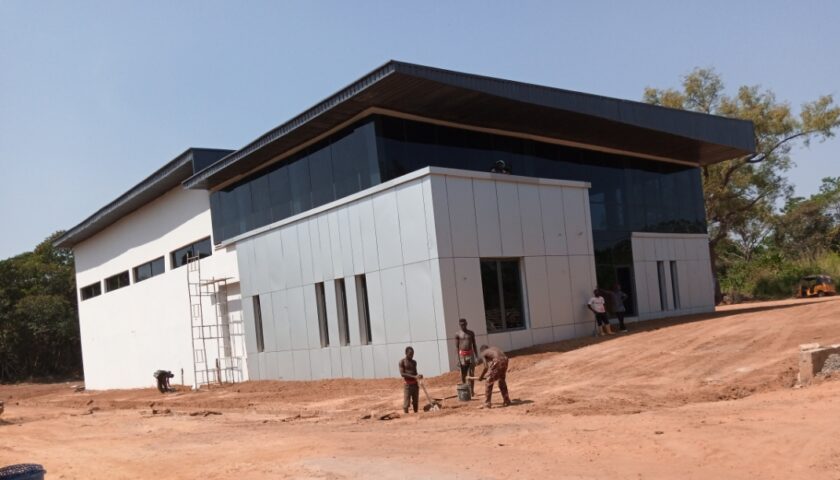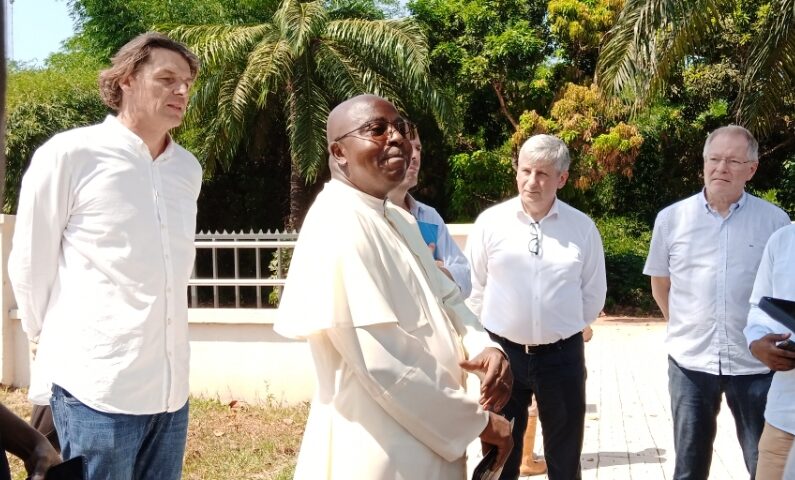The VC of GO-UNI, Rev. Fr. Prof. Christian Anieke, explaining a point during the inspection of the facilities at the Business Park
By Tony Adibe
The Centre of Practical Skills (CPS), a vocational training facility, and the Godfrey Okoye University European Business Park opened its permanent site, Ugwuomu Campus of the University, Emene, Enugu, Nigeria on Thursday.
NewsBits was informed that one of the aims of the initiative is to create prospects for the local population, a situation in which the skilled worker training is in line with European standards and is based on the dual principle of theory and practice.
“At the same time, the aim is to specifically attract Small and Medium-sized Enterprises (SMEs) to Nigeria with its large and growing market of over 220 million people,” explained Bernhard Schragl, the Spokesperson, Communication and Media Coordinator, the International Centre for Migration Policy Development (ICMPD), in a statement he issued to journalists on Wednesday in Enugu.
Schragl said that the ICMPD, founded in 1993, is an international organization with 19 member states and more than 460 staff members, and is reputed to be active in more than 90 countries worldwide, while taking a regional approach in its work to create efficient cooperation and partnerships along migration routes.

He said the priority regions include Africa, Central and South Asia, Europe, and the Middle East, stressing that “its 3-pillar approach to migration management – structurally linking research, migration dialogues and capacity building – contributes to better migration policy development worldwide.”
The Spokesperson further stated that the Vienna-based organization has a mission in Brussels, a regional office in Malta and project offices in several countries.
According to him, “the three major barriers that prevent SMEs from setting up in African countries have been overcome through the business park: first the infrastructure of the business park is in line with European standards and the park has its own independent supply of energy and water. Secondly, security is guaranteed by the business park’s partnership with Godfrey Okoye University (a Catholic university), a famous location institution. Thirdly, companies have access to skilled workers who they have helped to train in their own businesses.”
Schragl also stated that the “unique combination of private entrepreneur involvement and skilled worker training will enable 100 people per year to undertake dual education and training to learn skilled trades and become plumbers, electricians and construction supervisors.”
He said that the companies located in the business park will be responsible for the practical training, while the theory will be taught by the Centre of Practical Skills.
He said though the business park was set up by private investors, however, the Centre of Practical Skills is implemented by the International Centre for Migration Policy (ICMPD) in collaboration with private investors and the Austrian Development Agency (ADA), while operational support is provided by the GIZ funded by the German government.
The GO-UNI is a local partner and provided the land for the site, explained the Spokesman, who also said that in addition, the University certifies the education and training, as well as provides opportunities for further professional improvement. “As part of this cooperation, the skilled workers are additionally prepared for the labour market/private investors through an entrepreneurship programme,” he remarked.
Also in his brief remark, the ICMPD Director General Michael Spindelegger, who spoke on the key benefits of the initiative, said: ” A high and professional level of training helps all parties: people can find skilled worker, sustainable knowledge transfer takes place and companies have well skilled workers available.”
The Director General added: “For us, it’s about respectful cooperation on an equal footing from which all parties benefit – the people, the country and the companies.”
Spindelegger also said: ” Many European companies see the opportunities that exist in many African markets. Usually, only the really big ones dare to take the step. That is why we have created the conditions so that SMEs can establish themselves in a secure and stable environment.”
He further explained: “In view of these opportunities, many companies are willing to contribute to the training of workers they will soon employ. On this basis, they can then participate in Nigeria’s growing and yet unpenetrated market of over 220 million people.”
From 2024 onwards, he said that the aim would be to expand the training programme, to include building services, IT, food processing, textiles and tourism, to offer the corresponding training positions and to attract new companies.

He noted that there are also “plans to open a start-up Centre in 2025, which will help people to become self-employed and start their own businesses.”
The DG said all the funds invested in the business park so far which amounted to 4.5million Euros, have come from Austrian investors, adding: “The operating cost of the Centre of Practical Skills are covered by the German government through the GIZ as the main sponsor and by ADA.”
Spindelegger further said that to date, the companies that have set up businesses at the Business Park include the pipe systems producer KE KELIT, construction company Elite Bau, installation engineers Elektro MERL and the baking company Gragger.
“The companies highly value location factors such as the lack of a language barrier (the official language is English), the additional training in entrepreneurial thinking, the time difference of just one hour, and the legal assistance provided to start-ups by staff at the European Business Park,” he stated.





